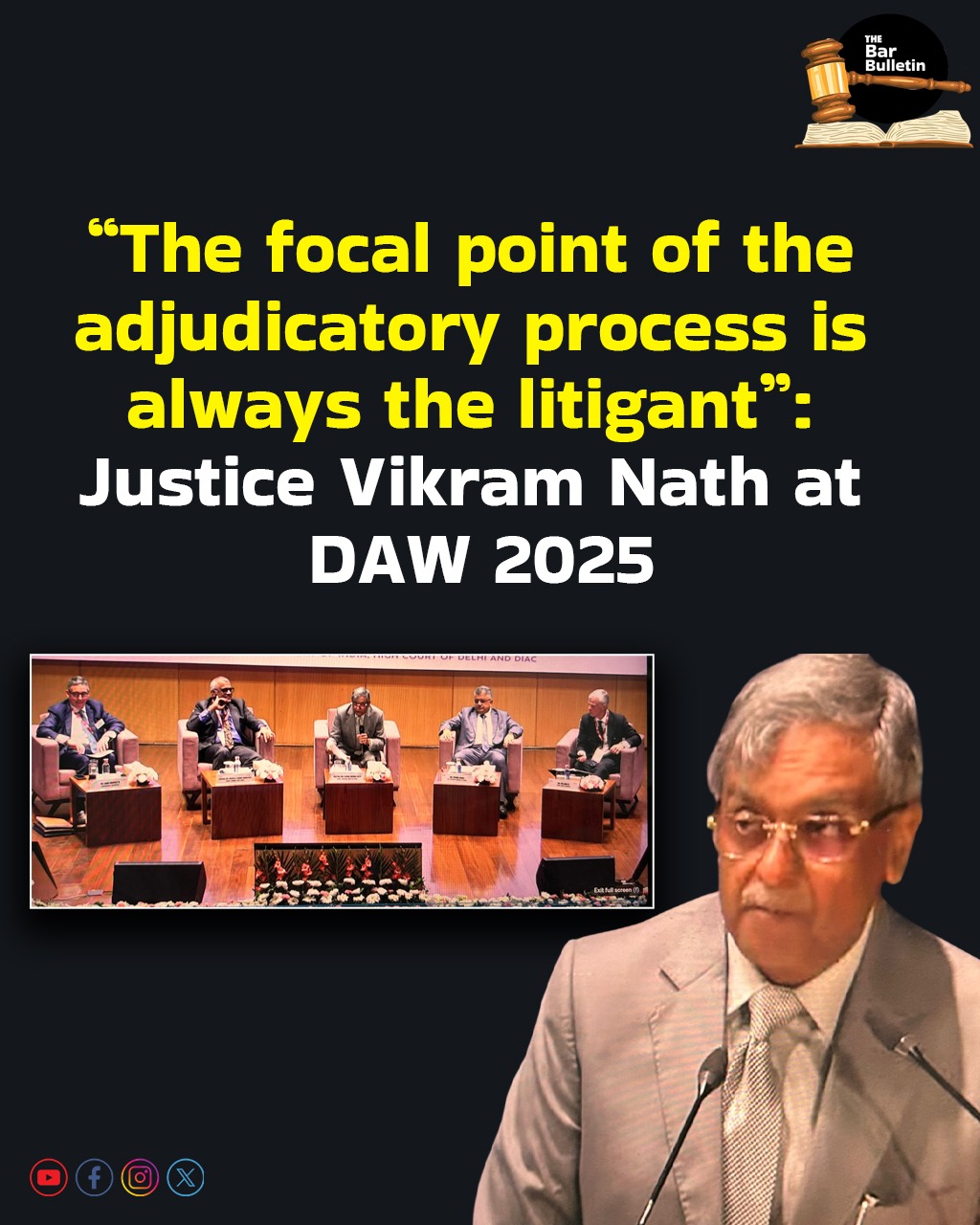The third day of the lecture sessions of the Delhi Arbitration Weekend (DAW) began with the first session on “Arbitration 2.0: Integration of Artificial Intelligence and Other Technologies to Enhance the Efficiency of Arbitration” on September 20, 2025, at the Delhi High Court. It was organised by the Delhi High Court in collaboration with the Delhi International Arbitration Centre (DIAC) and hosted jointly with the Supreme Court of India, the session brought together eminent jurists and arbitration experts, including Justice Vikram Nath, Judge, Supreme Court of India who chaired the session along with Mr. Tushar Mehta, Solicitor General of India, Justice N. Anand Venkatesh, Judge, Madras High Court, Mr. Tim Lord KC, Brick Court Chambers, and Mr. Mark Dempsey SC, Independent Arbitrator. The panel explored the opportunities, risks, and legal implications of integrating artificial intelligence into arbitration, highlighting both technological potential and the continuing centrality of human judgment in dispute resolution.
Justice Vikram Nath, Judge, Supreme Court of India, delivered the keynote address, emphasizing the centrality of the litigant in arbitration. Justice Vikram observed, “Equity, which will take care of empathy, which will take care of reading between the lines, takes a call and adjudicates. The focal point of the adjudicatory process is always the litigant.” His remarks underscored that while technology can support arbitration, it must not replace human judgment, discretion, and the application of mind. Justice Nath cautioned against delegating any task requiring genuine judicial reasoning, including administrative decisions such as Section 29 extensions, to AI.
Mr. Tushar Mehta, Solicitor General of India, addressed the practical and ethical challenges posed by AI in arbitration. Mr. Tushar highlighted concerns regarding confidentiality, inequality of arms, and potential errors in AI outputs. Mr. Tushar noted that large technology platforms capture extensive user data, raising significant confidentiality issues in legal contexts. Mr. Tushar emphasized, “Confidentiality in this medium is impossible to ensure without robust safeguards, even if statutory regulations exist.” He also explored the dual potential of AI to bridge resource gaps for smaller litigants while cautioning against over-reliance on AI in decision-making.
Justice N. Anand Venkatesh, Judge, Madras High Court, elaborated on the need for formal guidelines and certification for AI platforms used in arbitration. Justice Venkatesh advocated for institutional and nationwide standards, stressing the importance of bias testing, compliance with data protection laws, and auditability. He noted, “AI should always operate as a tool under effective human oversight and must not replace the tribunal’s ultimate authority.” Justice Venkatesh referenced frameworks like the European Union AI Act 2024 and judicial practice directions in Canada as examples of regulatory guidance.
Mr. Tim Lord KC, Brick Court Chambers, and Mr. Mark Dempsey SC, Independent Arbitrator, contributed concise perspectives. Mr. Tim observed, “AI can help focus attention on key issues in complex commercial disputes, streamlining proceedings without substituting human judgment.” Mr. Mark Dempsey SC highlighted the importance of transparency and disclosure, emphasizing, “AI may be used for drafting, research, or procedural support, provided its role is clearly communicated to all parties.”
The discussion addressed practical, ethical, and procedural dimensions of AI in arbitration. Mr. Tushar emphasized that AI-generated conclusions must remain challengeable, noting that awards relying solely on AI could be vulnerable under patent illegality or unintelligibility tests. Justice Venkatesh stressed the importance of certified AI platforms, advocating for bias testing, data protection compliance, and auditability to maintain fairness and uniformity across proceedings. Mr. Tim observed that AI can help focus on critical issues without replacing arbitral decision-making. Mr. Mark Dempsey SC reinforced the need for clear disclosure whenever AI is employed for drafting, research, or procedural assistance, ensuring that all parties are informed of its use. Justice Vikram Nath cautioned against delegating tasks requiring judgment or application of mind to AI, including administrative matters such as Section 29 extensions.
The session concluded with a consensus that AI, while capable of enhancing efficiency and resource allocation in arbitration, must operate under robust human oversight, institutional safeguards, and transparent practices to preserve fairness, confidentiality, and the rights of litigants.

